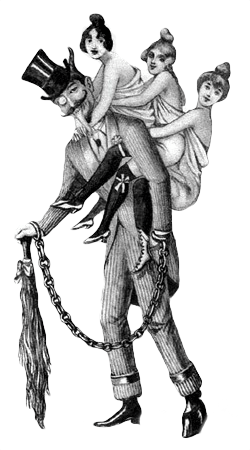A SpecGram Festivus
Not Necessarily for the
Rest of Us
Skip Tacular
SpecGram Minister of
Intern(al) Affairs
As we put to bed this, the final issue of SpecGram for the year 2012, it’s hard not to wonder whether it will in fact be the last issue of SpecGram ever. I don’t know whether or not the Linguistic Doomsday truly is coming—but just in case, the editorial board has collectively skipped town, to hunker down in their cold-war-era bunkers and fallout shelters, leaving me in charge—all the responsibility, none of the power, as usual.

A drawing of a dapper Krampus from a celebration of Indogermanischen Urlaub in the 1870s, thought by many to depict Editor-Living-Large Geertgen Pieter van der Meer—great-great-grandfather of Jonathan van der Meer, who still holds GPvdM’s inherited and updated title of “Editor-at-Large”—“escorting” three nubile young “informants” to “a private fieldwork session.”
On the off chance that the end of the world really is coming, and if you don’t have a journal that needs publishing, I suggest you spend a little extra time with your favorite big data sets and dig out your old textbooks to say hello, and perhaps goodbye, one last time to theories you may have lost touch with over the years. I’ve also heard rumors that some linguists have actual friends and family, and may want to spend a little extra time with them during this holiday season, but that may just be an urban legend.
Speaking of legends and holiday seasons, in the early 1860s, following the publication of August Schleicher’s Compendium der vergleichenden Grammatik der indogermanischen Sprachen in 1861, a number of anthropological linguists—who were at the time between gigs doing fieldwork for SpecGram—decided that they would apply Schleicher’s techniques to certain aspects of culture, and attempted to reconstruct the winter celebrations of the Proto-IndoEuropeans.
They based their reconstruction on innumerable festivals and observances, including but not limited to Anthesteria, Bacchanalia, Dísablót, Ganachakra, Hogmanay, Mōdraniht, Pancha Ganapati, Saturnalia, Yaldā, and Yule. The result combined all of the most socially uninhibited aspects of each celebration—based on the then-somewhat-popular theory that societies become more conservative over time—and was dubbed Indogermanischen Urlaub. This franken-holiday was both ridiculed as scholarship and embraced as ritual. For over a hundred years, many of the most powerful members of the SpecGram editorial board have engaged in rites too unsavory to have been recorded in the journal’s official historical records, though some unofficial documents—mostly drawings of lascivious debauchery and sybaritic impropriety—do exist. One of the few tame enough to publish is reproduced at right.
As a condition of the resurrection of SpecGram in the early 21st century, both sanctioned and unsanctioned celebrations of Indogermanischen Urlaub, which had already waned considerably by the 1980s, were outlawed.
Not that the SpecGram elite have been without winter festivities in the intervening years. Of late, some of the senior editors have been seen to celebrate a degenerate form of Festivus. They use an unsharpened red and blue checking pencil as a miniature Festivus pole and order Pan-Asian takeout for Festivus dinner. Skimping on these traditional elements is more than made up for during the Airing of Grievances, which can go on for several days—more than half of it taken up with rehashing old discussions of comma placement. Then follow the Feats of Strength, in which the junior editorial interns attempt to wrestle the Managing Editor to the ground. Since the Managing Editor is old and infirm, the duty of participating in the Feats of Strength falls to the Managing Editor’s Festivus Champion—a muscle-bound, steroid-enhanced, pea-brained lumberjack-cum-copy boy who has sent more than one intern to the hospital. That any interns survive unscathed is a Festivus Miracle.
Other than taking their Feats-of-Strength beat down, interns are generally not allowed to participate in the Festivus celebrations. Instead, they are allowed to commemorate the Pastafarian holiday of Holiday, and are given several packets of Ramen noodles to share amongst themselves, for which they are generally grateful.
You, Gentle Reader, have significantly more to celebrate in this issue, including a special holiday message from the editors to restore the faith of a little girl, a selection of hymns for the reverent linguist, a Christmas carol orthography puzzle, and a selection of linguistic-themed holiday gifts for Hanukkah, Ramadan, and Kwanzaa, along with the rest of this action-packed, super-sized issue!


